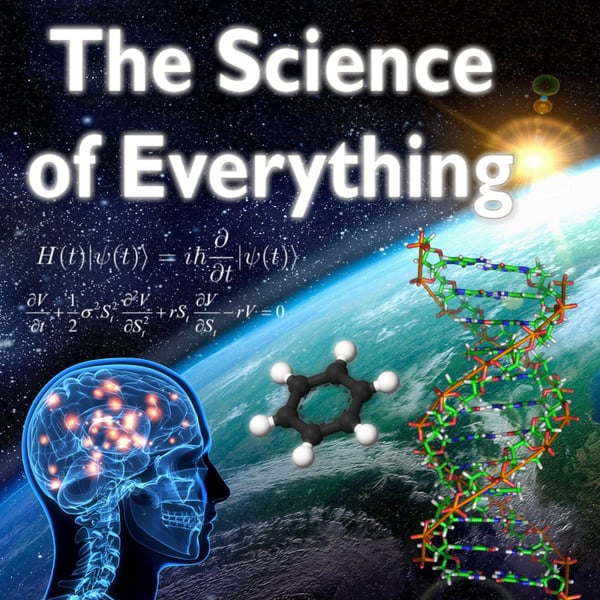Episode 8: History of the Atom
The Science of Everything Podcast
James Fodor
4.8 • 750 Ratings
🗓️ 28 November 2021
⏱️ 43 minutes
🧾️ Download transcript
Summary
Transcript
Click on a timestamp to play from that location
| 0:00.0 | I'm gonna'am! |
| 0:02.0 | Oh, |
| 0:03.0 | Oh, |
| 0:04.0 | and |
| 0:05.0 | Oh Hello and welcome to the Science of Everything podcast. |
| 0:36.6 | I'm your host, James Fodor. In this podcast, I discuss a wide variety of topics in the natural and social sciences, exploring the many fascinating scientific discoveries that can help us to better understand the world around us. In this eighth episode, the topic will be the atom. |
| 0:54.6 | And so in this episode, I'm going to look at the basic concept of what is an atom, |
| 1:00.3 | and then go through the history of the term, |
| 1:04.1 | and more specifically, a look at the different models of the atom that have been used |
| 1:09.9 | and changed throughout the |
| 1:12.3 | mostly 19th and 20th centuries as new scientific discoveries have been made. |
| 1:17.5 | So to start off with, what is an atom? |
| 1:20.6 | Well, basically an atom is just the smallest unit into which any substance can be decomposed |
| 1:27.2 | or broken down into whilst still retaining |
| 1:31.1 | its chemical properties. So each different element can be like, for example, iron, tin, silver, |
| 1:40.5 | gold, etc., can be broken down into smaller and smaller pieces until you get to an atom. |
| 1:46.5 | Once you get to an atom of gold or silver, of oxygen, or whatever, you cannot break it down |
| 1:51.7 | any further without destroying the unique chemical properties of that atom. |
| 1:57.7 | The term atom was originated in ancient Greek philosophy, where it was used to describe the smallest bit of matter, or the smallest piece of matter that could be conceived of. |
| 2:09.6 | The word actually derives from the Greek word atomos, which means indivisible. |
| 2:16.6 | So the concept was that this was kind of the smallest |
| 2:19.8 | piece of matter you could imagine, and that it was indivisible, you couldn't divide it anymore. |
... |
Please login to see the full transcript.
Disclaimer: The podcast and artwork embedded on this page are from James Fodor, and are the property of its owner and not affiliated with or endorsed by Tapesearch.
Generated transcripts are the property of James Fodor and are distributed freely under the Fair Use doctrine. Transcripts generated by Tapesearch are not guaranteed to be accurate.
Copyright © Tapesearch 2025.

